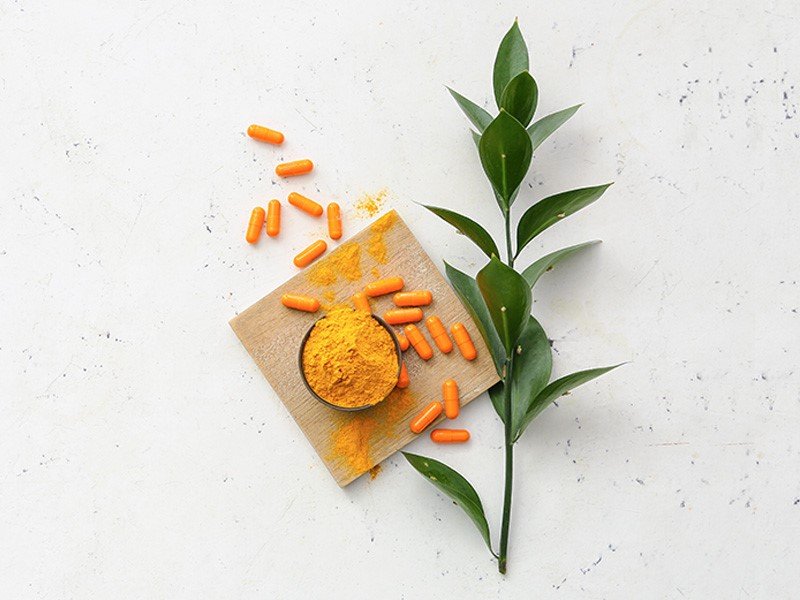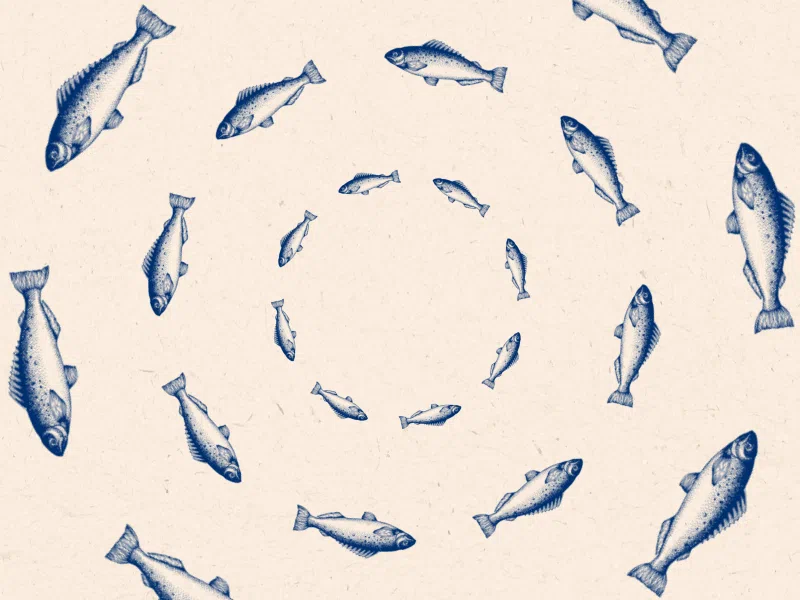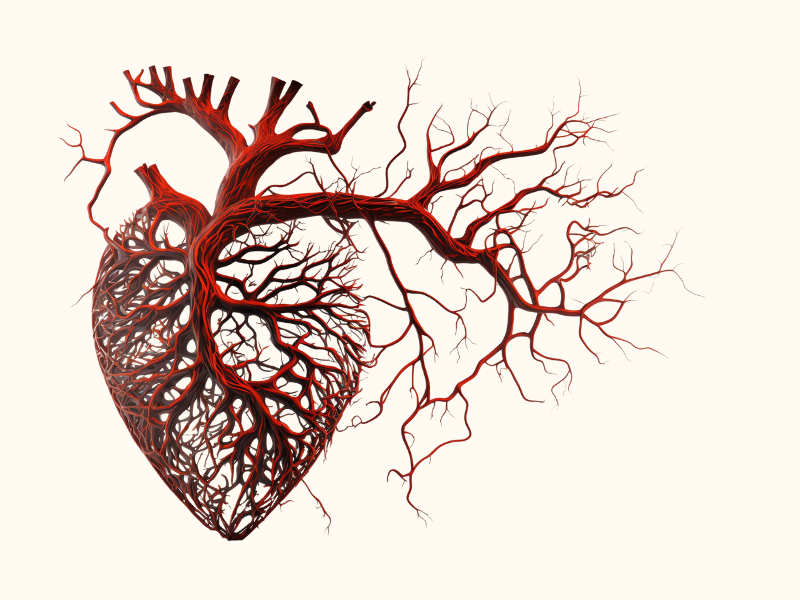07/12/2021
Multiple Ways Curcumin Can Help You Stay Healthy

Curcumin is perhaps one of the most omnipotent natural health ingredient there is and its widespread benefits are well-documented.
The polyphenol curcumin is a yellowish naturally occurring pigment extracted from the root of turmeric, a plant in the ginger family. The most beneficial compounds in turmeric are curcuminoids, including curcumin and related compounds.
It has been in use in Ayurvedic medicine for thousands of years, and that is for a good reason. In fact, the health benefits of this natural ingredient are so numerous that it ought to be a part of any serious supplementation program!
We have collected many of the anti-aging advantages of this superfood:
Curcumin is a powerful antioxidant
Fighting off free radicals is crucial to good health.
Free radicals molecules are missing an electron from their outer shell. That makes them unstable, so they go and steal an electron from the molecules in your skin cells, or from your blood cells, or from wherever they can.
The body generates free radicals in response to environmental insults, such as tobacco smoke, ultraviolet rays, and air pollution, but they are also a natural byproduct of normal processes in cells.
Over time, our cells will inadvertently be affected by free radicals, and too many free radicals create oxidative stress — cells get damaged and even die. When your body is experiencing oxidative stress, we find signs of aging and disease.
In other words; if free radicals are left to roam freely in the body they can contribute to chronic inflammation, aging acceleration, and more.
So, to not let free radicals go wild, we need antioxidants to keep them in check. An antioxidant is a general term for any compound that can counteract these unstable free radical molecules that damage DNA, cell membranes, and other parts of cells.
Numerous antioxidants have been associated with protection against many afflictions that commonly accompany aging, such as muscle loss, cataracts, and memory impairment.
Studies show that the antioxidant quality of curcumin can inhibit the impact of free radicals by scavenging the body for free radicals and neutralizing them. (1)
Curcumin can help protect your brain
There are many factors that cause the brain to age.
These include cumulative effects of oxidative stress, environmental toxins, inflammation, build up of toxic proteins and gradual damage of genes in individual cells.
Curcumin may, however, help to protect against these factors in the brain. There are indications that curcumin can (2-6):
- Turn on genes responsible for triggering the emergence of new neurons (excitable brain cells)
- Improve performance on memory tests
- Reduce neuroinflammation
- Protect against memory loss
Curcumin is good for your cardiovascular system
There is no doubt that exercise is good for the heart.
Curcumin is benefitial for the heart because it helps improve endothelial function – the functioning of the inner lining of blood vessels. Researchers have compared exercise to curcumin supplementation and found that it was just as good at improving endothelial function as regular exercise. (7)
Morover, it's shown to help normalize blood lipid profiles. One study of young, obese men found that curcumin-galactomannan improved cardiovascular risk factors. There was a 34% increase in HDL (“good”) cholesterol and a 29% reduction in harmful levels of homocysteine, an amino acid linked to development of heart disease. (8)
In two other studies, there was also significant improvement in measures of arterial stiffness, a risk factor for cardiovascular mortality. (9,10)
Curcumin can promote your immune system
Curcumin can help enhance the body’s immune system in general.
Numerous preclinical studies indicate curcumin may activate antiviral immunity, and it has demonstrated antiviral effects against a range of respiratory viruses.
Curcumin also helps mitigate inflammation associated with the immune response to infection. (11-15)
Curcumin can help supress inflammation
In short, chronic inflammation is an age-accelerating process.
Morover, inflammation is associated with conditions such as arthritis/osteoarthritis, obesity, metabolic syndrome, heart disease, glucose intolerance, lipid, high blood pressure (hypertension), gastrointestinal disorders disturbances, and more. Together, these factors also contribute to chronic inflammation.
In other words; suppressing inflammatory changes is a very good way to protect your health!
In a 2015 randomized controlled trial, subjects with metabolic syndrome took either a placebo or one gram a day of curcumin formulated with bioperine, a natural compound added to improve absorption. After 8 weeks, those taking the curcumin experienced significant reductions in markers of chemical stress while boosting natural protective enzyme systems. The end result was a reduction in overall levels of inflammation. (16)
Other recent studies have confirmed that taking one gram a day of curcumin (with enhanced bioavailability) may lead to significant reductions in levels of numerous inflammatory cytokines (signaling molecules) that mediate the myriad destructive effects of chronic inflammation. (17,18)
More great anti-aging properties of curcumin
Researchers are discovering that curcumin has even more anti-aging properties that can combat several key factors of aging.
This superfood can help protect your genes in two ways. Because curcumin is an antioxidant it prevents free radicals from inflicting damage on your DNA-strands. Simultaneously, it can also help to upregulate specific genes that help destroy cells with certain types of mutations.
All the above mantioned health benefits are of anti-aging, but this list is far from complete! Studies show that curcumin can also help:
Eliminate senescent cells: As cells age, some become senescent (dysfunctional). Curcumin has shown senolytic activity, which means it has the potential to reduce the number of senescent cells in tissues. (19-21)
Increase telomere length: Every strand of DNA in our body has protective end caps, called telomeres, that help maintain the stability and function of the genetic material. As we age, these telomeres shorten. Curcumin can help increase telomere length. (22,23)
Fighting glycation: Glycation occurs when sugars attach to proteins, fats, or nucleic acids, causing harmful changes. This process even occurs in people with normal blood glucose. Preclinical studies have shown that curcumin protects from the damage caused by glycation. (24-28)
AMPK-activation: AMPK is an enzyme (protein) found in every cell supporting healthy metabolism. Curumin is shown to boost the activity of AMPK. (29-31)
Autophagy: Curcumin can help activate autophagy, a form of cellular “house-keeping”. This means rejuvenating cells and keeping them functioning optimally. (32)
Anti-glycemic effects: Curcumin is shown to reduce the impact of high glucose and enhancing control of blood sugar levels in metabolic syndrome and diabetes. (33,34)
Mitochondria: Mitochondrial dysfunction is a primary cause of age-related decline and loss of energy. Curcumin is shown to lessen damage and support healthy mitochondrial function. (35)
Anti-cancer: In addition to reducing chronic inflammation and oxidative damage caused by free radicals, both of which contribute to the development of cancer, curcumin has been shown to have anti-cancer effects. It may help prevent the formation of tumors, induce cell death in existing cancer cells, and block their spread in the body. (36-37)
Regulating vital proteins: Maladaptive activity of various essential structural and functional proteins in cells has been tied to accelerated aging, metabolic abnormalities, and chronic inflammation. Curcumin can modulate their activity in ways that reverse age-related changes and protect cells against age-related damage. This positively affects every one of the following targets and can (38-42):
- Inhibit nuclear factor-kappa B/NF-kB (a protein complex associated with chronic inflammation)
- Reduce activity of mTOR (a protein linked to rapid aging and metabolic abnormalities that contribute to chronic disease)
- Boost activity of AMPK (look above)
- Enhance function of sirtuins (proteins critical for maintaining health and longevity)
- Support activity of Nrf2 (a protein that regulates the body’s defenses against oxidative stress)
- Suppress STAT3, a protein associated with chronic inflammation and some cancers
Moreover, in one animal study, curcumin extended average lifespan by 26%. (43) The accumulating evidence indicates that curcumin helps stave off the aging process. (32,44)
The solution for curcumin's poor oral bioavailability
The health benefits of this ingredient cannot be overstated.
Curcumin has one drawback — poor oral bioavailability. Relatively little of ingested curcumin finds its way into the bloodstream.
Scientists have discovered a way, a new method, around this problem. By combining curcumin with a fiber called galactomannans, from the spice fenugreek, the curcumin is protected in the gut and resists metabolism.
Blood levels in people who received this curcumin encased in fenugreek fiber were 45 times greater than in those who took unformulated curcumin. (45,46)
The Life Extension's Curcumin Elite™ Turmeric Extract formula can preserve curcuminoids’ bioavailability, so you get the maximum possible benefit — 45,5 times more bioavailable free curcuminoids as well as 270 times better absorption of curcuminoids than standard curcumin.
The much higher bioavailability and absorption rates can enhance the many health benefits of curcumin supplementation.
Find all the curcumin supplements >>
Read more on whole body health
- Health basic — start your journey here
- Why should you supplement with omega-3s?
- Crucial nutrients for strong bones & health
- NAD+: Stem cell renewal & mitochondria regeneration
- The supplement pyramid
- See all the blogs posts
References
- https://www.lifeextension.com/magazine/2014/2/bio-enhanced-turmeric-compounds-block-multiple-inflammatory-pathways
- Voulgaropoulou SD, van Amelsvoort T, Prickaerts J, et al. The effect of curcumin on cognition in Alzheimer’s disease and healthy aging: A systematic review of pre-clinical and clinical studies. Brain Res. 2019 Dec 15;1725:146476.
- Yu Y, Shen Q, Lai Y, et al. Anti-inflammatory Effects of Curcumin in Microglial Cells. Front Pharmacol. 2018;9:386.
- Sunny A, Ramalingam K, Das S, et al. Bioavailable curcumin alleviates lipopolysaccharide-induced neuroinflammation and improves cognition in experimental animals. Pharmacognosy Magazine. 2019 April 1, 2019;15(62):111-7.
- Khanna A, Das SS, Kannan R, et al. The effects of oral administration of curcumin-galactomannan complex on brain waves are consistent with brain penetration: a randomized, double-blinded, placebo-controlled pilot study. Nutr Neurosci. 2020 Dec 9:1-10.
- Dong S, Zeng Q, Mitchell ES, et al. Curcumin enhances neurogenesis and cognition in aged rats: implications for transcriptional interactions related to growth and synaptic plasticity. PLoS One. 2012;7(2):e31211
- https://www.lifeextension.com/magazine/2017/10/curcumin-targets-cardiovascular-disorders
- Campbell MS, Ouyang A, I MK, et al. Influence of enhanced bioavailable curcumin on obesity-associated cardiovascular disease risk factors and arterial function: A double-blinded, randomized, controlled trial. Nutrition. 2019 Jun;62:135-9.
- Campbell MS, Berrones AJ, Krishnakumar IM, et al. Responsiveness to curcumin intervention is associated with reduced aortic stiffness in young, obese men with higher initial stiffness. J Funct Foods. 2017;29:154-60.
- Dabelea D, Talton JW, D’Agostino R, Jr., et al. Cardiovascular risk factors are associated with increased arterial stiffness in youth with type 1 diabetes: the SEARCH CVD study. Diabetes Care. 2013 Dec;36(12):3938-43.
- Dai J, Gu L, Su Y, et al. Inhibition of curcumin on influenza A virus infection and influenzal pneumonia via oxidative stress, TLR2/4, p38/JNK MAPK and NF-κB pathways. International immunopharmacology. Jan 2018;54:177-187. doi:10.1016/j.intimp.2017.11.009
- Han S, Xu J, Guo X, Huang M. Curcumin ameliorates severe influenza pneumonia via attenuating lung injury and regulating macrophage cytokines production. Clin Exp Pharmacol Physiol. Jan 2018;45(1):84-93. doi:10.1111/1440-1681.12848
- Obata K, Kojima T, Masaki T, et al. Curcumin prevents replication of respiratory syncytial virus and the epithelial responses to it in human nasal epithelial cells. PLoS One. 2013;8(9):e70225. doi:10.1371/journal.pone.0070225
- Xu Y, Liu L. Curcumin alleviates macrophage activation and lung inflammation induced by influenza virus infection through inhibiting the NF-κB signaling pathway. Influenza Other Respir Viruses. Sep 2017;11(5):457-463. doi:10.1111/irv.12459
- Zuccotti GV, Trabattoni D, Morelli M, Borgonovo S, Schneider L, Clerici M. Immune modulation by lactoferrin and curcumin in children with recurrent respiratory infections. Journal of biological regulators and homeostatic agents. Apr-Jun 2009;23(2):119-23.
- Panahi Y, Hosseini MS, Khalili N, et al. Antioxidant and anti-inflammatory effects of curcuminoid-piperine combination in subjects with metabolic syndrome: A randomized controlled trial and an updated meta-analysis. Clin Nutr. 2015;34(6):1101-8.
- Ganjali S, Sahebkar A, Mahdipour E, et al. Investigation of the effects of curcumin on serum cytokines in obese individuals: a randomized controlled trial. ScientificWorldJournal. 2014;2014:898361.
- Panahi Y, Hosseini MS, Khalili N, et al. Effects of curcumin on serum cytokine concentrations in subjects with metabolic syndrome: A post-hoc analysis of a randomized controlled trial. Biomed Pharmacother. 2016;82:578-82.
- Cherif H, Bisson DG, Jarzem P, et al. Curcumin and o-Vanillin Exhibit Evidence of Senolytic Activity in Human IVD Cells In Vitro. J Clin Med. 2019 Mar 29;8(4).
- You J, Sun J, Ma T, et al. Curcumin induces therapeutic angiogenesis in a diabetic mouse hindlimb ischemia model via modulating the function of endothelial progenitor cells. Stem Cell Res Ther. 2017 Aug 3;8(1):182.
- Yousefzadeh MJ, Zhu Y, McGowan SJ, et al. Fisetin is a senotherapeutic that extends health and lifespan. EBioMedicine. 2018 Oct;36:18-28.
- Taka T, Changtam C, Thaichana P, et al. Curcuminoid derivatives enhance telomerase activity in an in vitro TRAP assay. Bioorg Med Chem Lett. 2014 Nov 15;24(22):5242-6.
- Xiao Z, Zhang A, Lin J, et al. Telomerase: a target for therapeutic effects of curcumin and a curcumin derivative in Abeta1-42 insult in vitro. PLoS One. 2014;9(7):e101251.
- Hu TY, Liu CL, Chyau CC, et al. Trapping of methylglyoxal by curcumin in cell-free systems and in human umbilical vein endothelial cells. J Agric Food Chem. 2012 Aug 22;60(33):8190-6.
- Liu JP, Feng L, Zhu MM, et al. The in vitro protective effects of curcumin and demethoxycurcumin in Curcuma longa extract on advanced glycation end products-induced mesangial cell apoptosis and oxidative stress. Planta Med. 2012 Nov;78(16):1757-60.
- Sajithlal GB, Chithra P, Chandrakasan G. Effect of curcumin on the advanced glycation and cross-linking of collagen in diabetic rats. Biochem Pharmacol. 1998 Dec 15;56(12):1607-14.
- Lima TFO, Costa MC, Figueiredo ID, et al. Curcumin, Alone or in Combination with Aminoguanidine, Increases Antioxidant Defenses and Glycation Product Detoxification in Streptozotocin-Diabetic Rats: A Therapeutic Strategy to Mitigate Glycoxidative Stress. Oxid Med Cell Longev. 2020;2020:1036360.
- Tang Y, Chen A. Curcumin eliminates the effect of advanced glycation end-products (AGEs) on the divergent regulation of gene expression of receptors of AGEs by interrupting leptin signaling. Lab Invest. 2014 May;94(5):503-16.
- Lyons CL, Roche HM. Nutritional Modulation of AMPK-Impact upon Metabolic-Inflammation. Int J Mol Sci. 2018 Oct 9;19(10).
- Um MY, Hwang KH, Ahn J, et al. Curcumin attenuates diet-induced hepatic steatosis by activating AMP-activated protein kinase. Basic Clin Pharmacol Toxicol. 2013 Sep;113(3):152-7.
- Zendedel E, Butler AE, Atkin SL, et al. Impact of curcumin on sirtuins: A review. J Cell Biochem. 2018 Dec;119(12):10291-300.
- Bielak-Zmijewska A, Grabowska W, Ciolko A, et al. The Role of Curcumin in the Modulation of Ageing. Int J Mol Sci. 2019 Mar 12;20(5).
- de Oliveira MR, Jardim FR, Setzer WN, et al. Curcumin, mitochondrial biogenesis, and mitophagy: Exploring recent data and indicating future needs. Biotechnol Adv. 2016 Sep-Oct;34(5):813-26.
- Sandur SK, Ichikawa H, Pandey MK, et al. Role of pro-oxidants and antioxidants in the anti-inflammatory and apoptotic effects of curcumin (diferuloylmethane). Free Radic Biol Med. 2007 Aug 15;43(4):568-80.
- Rahimi HR, Mohammadpour AH, Dastani M, et al. The effect of nano-curcumin on HbA1c, fasting blood glucose, and lipid profile in diabetic subjects: a randomized clinical trial. Avicenna J Phytomed. 2016 Sep-Oct;6(5):567-77.
- Jin T, Song Z, Weng J, et al. Curcumin and other dietary polyphenols: potential mechanisms of metabolic actions and therapy for diabetes and obesity. Am J Physiol Endocrinol Metab. 2018 Mar 1;314(3):E201-E5.
- Deguchi A. Curcumin targets in inflammation and cancer. Endocr Metab Immune Disord Drug Targets. 2015;15(2):88-96.
- Tomeh MA, Hadianamrei R, Zhao X. A Review of Curcumin and Its Derivatives as Anticancer Agents. Int J Mol Sci. 2019 Feb 27;20(5).
- Bahrami A, Montecucco F, Carbone F, et al. Effects of Curcumin on Aging: Molecular Mechanisms and Experimental Evidence. Biomed Res Int. 2021;2021:8972074.
- Benameur T, Soleti R, Panaro MA, et al. Curcumin as Prospective Anti-Aging Natural Compound: Focus on Brain. Molecules. 2021 Aug 7;26(16).
- Zia A, Farkhondeh T, Pourbagher-Shahri AM, et al. The role of curcumin in aging and senescence: Molecular mechanisms. Biomed Pharmacother. 2021 Feb;134:111119.
- Deguchi A. Curcumin targets in inflammation and cancer. Endocr Metab Immune Disord Drug Targets. 2015;15(2):88-96.
- Shen LR, Xiao F, Yuan P, et al. Curcumin-supplemented diets increase superoxide dismutase activity and mean lifespan in Drosophila. Age (Dordr). 2013 Aug;35(4):1133-42.
- Sikora E, Bielak-Zmijewska A, Mosieniak G, et al. The promise of slow down ageing may come from curcumin. Curr Pharm Des. 2010;16(7):884-92.
- Kumar D, Jacob D,
Subash PS, et al. Enhanced bioavailability and relative distribution of
free (unconjugated) curcuminoids following the oral administration of a
food-grade formulation with fenugreek dietary fibre: a randomised double-blind
crossover study. J Funct Foods. 2016;22:578-87.
- https://www.lifeextension.com/magazine/2021/ss/curcumin-anti-aging






